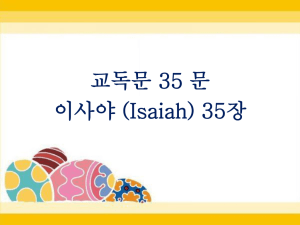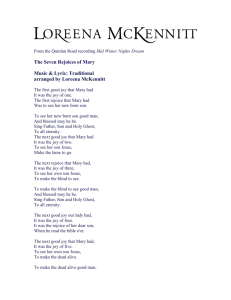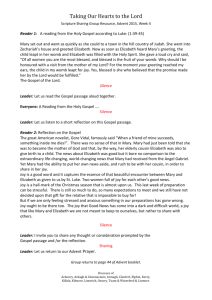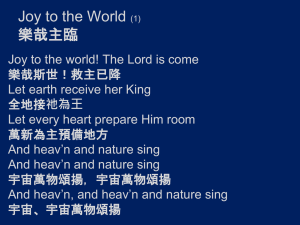Witnesses and Proclaimers of Joy with Mary
advertisement
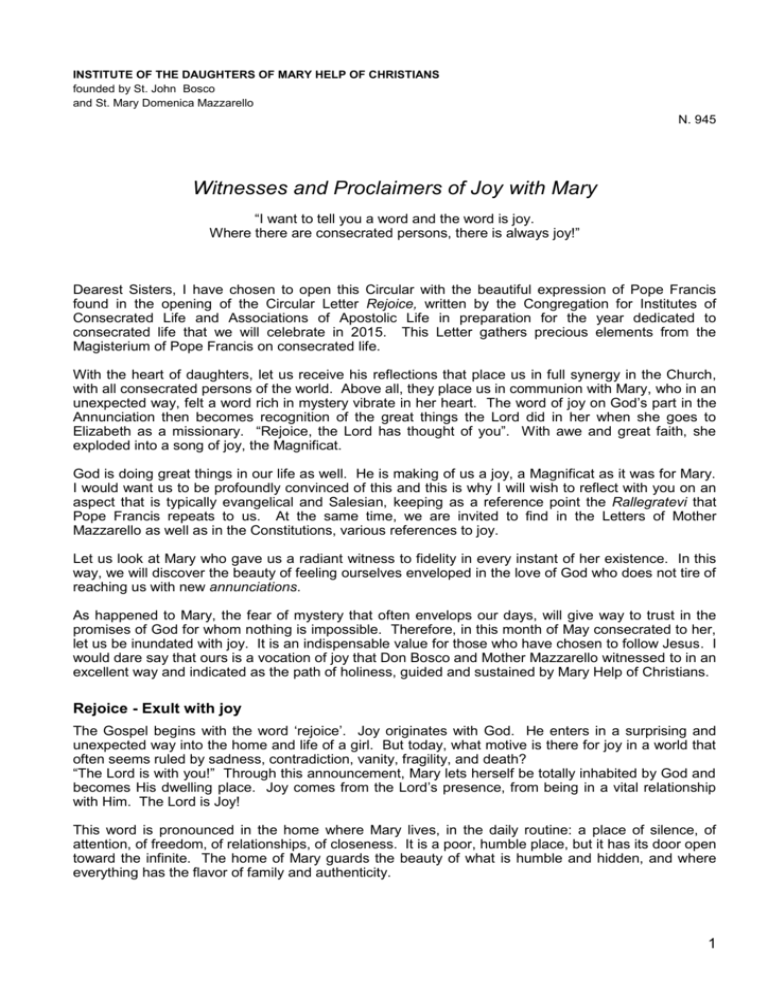
INSTITUTE OF THE DAUGHTERS OF MARY HELP OF CHRISTIANS founded by St. John Bosco and St. Mary Domenica Mazzarello N. 945 Witnesses and Proclaimers of Joy with Mary “I want to tell you a word and the word is joy. Where there are consecrated persons, there is always joy!” Dearest Sisters, I have chosen to open this Circular with the beautiful expression of Pope Francis found in the opening of the Circular Letter Rejoice, written by the Congregation for Institutes of Consecrated Life and Associations of Apostolic Life in preparation for the year dedicated to consecrated life that we will celebrate in 2015. This Letter gathers precious elements from the Magisterium of Pope Francis on consecrated life. With the heart of daughters, let us receive his reflections that place us in full synergy in the Church, with all consecrated persons of the world. Above all, they place us in communion with Mary, who in an unexpected way, felt a word rich in mystery vibrate in her heart. The word of joy on God’s part in the Annunciation then becomes recognition of the great things the Lord did in her when she goes to Elizabeth as a missionary. “Rejoice, the Lord has thought of you”. With awe and great faith, she exploded into a song of joy, the Magnificat. God is doing great things in our life as well. He is making of us a joy, a Magnificat as it was for Mary. I would want us to be profoundly convinced of this and this is why I will wish to reflect with you on an aspect that is typically evangelical and Salesian, keeping as a reference point the Rallegratevi that Pope Francis repeats to us. At the same time, we are invited to find in the Letters of Mother Mazzarello as well as in the Constitutions, various references to joy. Let us look at Mary who gave us a radiant witness to fidelity in every instant of her existence. In this way, we will discover the beauty of feeling ourselves enveloped in the love of God who does not tire of reaching us with new annunciations. As happened to Mary, the fear of mystery that often envelops our days, will give way to trust in the promises of God for whom nothing is impossible. Therefore, in this month of May consecrated to her, let us be inundated with joy. It is an indispensable value for those who have chosen to follow Jesus. I would dare say that ours is a vocation of joy that Don Bosco and Mother Mazzarello witnessed to in an excellent way and indicated as the path of holiness, guided and sustained by Mary Help of Christians. Rejoice - Exult with joy The Gospel begins with the word ‘rejoice’. Joy originates with God. He enters in a surprising and unexpected way into the home and life of a girl. But today, what motive is there for joy in a world that often seems ruled by sadness, contradiction, vanity, fragility, and death? “The Lord is with you!” Through this announcement, Mary lets herself be totally inhabited by God and becomes His dwelling place. Joy comes from the Lord’s presence, from being in a vital relationship with Him. The Lord is Joy! This word is pronounced in the home where Mary lives, in the daily routine: a place of silence, of attention, of freedom, of relationships, of closeness. It is a poor, humble place, but it has its door open toward the infinite. The home of Mary guards the beauty of what is humble and hidden, and where everything has the flavor of family and authenticity. 1 In this home, God’s Word can echo freely. The Angel enters. He asks her to open herself to joy. The Good News cannot be listened to if the heart does not believe, does not hope, is not disposed to God’s uniqueness. This does not remove anxiety. This is why the angel reassures her, “Do not be afraid. You have found favour with God. He has looked upon you”. He announces the mystery of the Incarnation of the Son of God, “You will conceive a bear a Son and you will name Him Jesus”. Mary is surprised, but does not ask for a sign. She asks for the meaning of his words, “How can this be?” It will happen in humility, the fundamental characteristic of God’s action, “The power of the Most High will overshadow you”. Mary’s yes now explodes fully and trustfully. She receives the mystery that will mark the rhythm of her life to the end. Mary’s yes coincides with the Son’s adhesion to the Father’s one plan of love. Mary makes herself the ‘living home’ of the Lord, the temple where the Most High dwells (Cf. homily of Benedict XVI at Loreto, October 4, 2012). Contemplating her in all her interior beauty, let us ask ourselves if we, like her, are open to God’s requests, if we want to offer our existence to be a home inhabited by Him. Or are we instead stopped by the fear that His annunciations may limit our freedom to reserve a part of our life so that it may belong to us alone. As soon as the Angel departed, Mary left in haste for the mountains of Judea to share the joy she carried in her womb with Elizabeth. Dear Sisters, the home of Mary is the home of joy. We too, like her, have received a vocation. The Lord said to us, “I am counting on you!” In the Letter Rallegratevi, we hear again the word of Pope Francis who tells us joy comes from feeling that we are looked at by God, chosen by Him, and continually urged to go out of ourselves to center our life in Christ (Cf. no. 4). He solicits us to take up a wisdom journey, to accomplish an interior pilgrimage to return to the first hour where the places are warm with friendly relationships. There, the intelligence is led to open itself to mystery, and the decision is made that it is good to place oneself in the sequela of the Teacher who alone has the words of eternal life (Cf. John 6:68) He invites us to make our existence a pilgrimage of transformation into love. It is important to pause on the photo of the beginning, ‘the joy of the moment in which Jesus looked at me’. This pause will allow us to be reborn, to renew our personal encounter with Him, and to seek Him unceasingly each day, to hear again the voice of God who calls me, “Rejoice. You are important to me” (Cf. no. 4). With the words of Pope Francis, I ask each of you, “Look into the depths of your heart. Look into your intimate self. Ask yourself, do I have a heart that desires something great or a heart that is drowsy with things? Has your heart preserved the restlessness of the search or has it been suffocated by things that end up atrophying it?” (No. 4) How do we respond today to the you of God who calls us by name? Is the call we perceived one day capable of being open to the future, of illumining our steps during our life? Does it warm our heart and know how to reawaken the heart of others? I would personally ask you, how is the home of our heart and that of the community? Does it resound with the joy of the call? Is it pervaded by the search for meaning, by the reception of the Word, and the effort to let it transform us and generate life? Called to be joy and to communicate joy Looking at Mary in her everyday life and contemplating her in the strong times in which God called upon her to repeat her yes, opens unlimited horizons of light for us. The Circular in Preparation for General Chapter XXIII helps us to revisit the meaningful experiences Mary lived. In the life of Jesus and of the Church, she accomplishes the Biblical meaning of the home as God’s dwelling place. I invite you to penetrate these experiences with the heart’s intelligence, with the love proper to daughters who ardently desire to be like their Mother, and with her to build something new in preparation for a tomorrow that promises hope and is therefore the source of joy. We meet her in the moment of her first yes at Nazareth and we follow her as she goes to Elizabeth where the house fills with joy and the song of the Magnificat flows out and resounds still today in all its splendour. We enjoy her initiative at Cana and suffer with her at the foot of the Cross - at a moment that is both burdensome and joyful when Jesus entrusts her to John and he receives her into his home, into his life, and into his heart. Let us remain with her in the Cenacle, the home that recalls the 2 intimacy of Jesus with His own, and now, emptied of the Son’s physical presence, is inhabited by the Holy Spirit, the source of joy. Throughout her whole life, Mary is a bright witness for us of how to build the home, how to inhabit the home, how to be home. It is a journey of pedagogical depth that leads us back to our charismatic origins, as Don Bosco and Mother Mazzarello let themselves be guided by her presence with immense trust, step after step. We can say that Valdocco and Mornese are ‘the lands of joy’ in which we savour the reflection of God, the joy of the heart (Cf. Is 66: 14) that radiates and diffuses the beauty of a life given to God, totally and unconditionally, as that of Mary, founded on the Rock, on faith in the Word. A great motive for joy is the presence of the young in our life and in our prayer. They fill us with joy! Pope Francis reminds us that the beauty of consecration “Is joy, joy…there is no holiness in sadness…do not be sad like those who have no hope” (Encounter with Seminarians and Novices, July 6, 2013). Joy is an essential part of our identity as consecrated Salesian women. It is not an ornament of circumstance, of the occasion, of appearances. If it were thus, we would fall into the delusion of a life built on sand, on ephemeral seeking for personal success, of self-affirmation, of self-referencing, of the contingent. I feel in my heart that Mary waits to see us as FMA rich in joy, called to guard our charismatic identity with fidelity, and enculturate it in the complex social reality, that is also rich in new opportunities to proclaim the Gospel. Perhaps some feel sentiments of nostalgia or discouragement thinking of the atmosphere of Valdocco and Mornese that we do not always find in our places. Sometimes we perceive it as far from us, almost as a lost value, and we feel incapable of making it shine in our communities. If we feel this way, I ask you with all my heart to dispel it like a dangerous temptation that can manifest itself in moments of doubt, of misunderstanding, of pastoral failure, or in other situations of personal or community suffering. They are situations that are part of life and that can find comfort in the Pope’s word that invites us to look to Mary. “At the foot of the Cross, Mary is a woman of suffering, and at the same time, of vigilant waiting for a mystery that is greater than suffering and is about to be accomplished. Everything really seemed over. It could be said that all hope was extinguished. Remembering the words of the Annunciation, she could have said, they have not come true… I was fooled. However, she did not say this. And yet she, blest because she believed, saw a new future blossom forth from her faith, and waited in hope for God’s tomorrow” (to the Camaldolese Nuns, November 21, 2013). A key to face and overcome these situations is found in seeking to make the people we meet happy, our sisters and the young, because we are all searching for God and for meaning in life. Our happiness must be that of making others happy. The Lord Himself uses this road with us. He is happy when our life is resplendent with joy, with happiness. Sisters, this is the true fruitfulness of our existence as consecrated women! Let us look deeply again at our life of faith. Do we rely on our strength or on Jesus who is the Rock? Are we ready, as the Holy Father asks us, to look beyond today, to be open to God’s tomorrow and to His surprises? The Pope’s questions also suggest the conditions for being with the young today a home that evangelizes as it was for our Founders. It can be this way for us, homes founded on God and inhabited by His presence; homes that generate life, promoting it by gestures of sincere, foreseeing, affectionate, and respectful humanity. I hold in my heart the desire of many sisters who share with me their deep need to ‘inhabit’ communities that have a family atmosphere, where God is at the centre, where authentic relationships are lived and are open to assume the mission together, without egotistical resistances and individualistic tendencies. What is it that sometimes stops us from being God’s family, FMA who with Him build the family He wants day by day, in the demanding but beautiful spirit of the da mini animas cetera tolle? 3 Let us act in such a way as to be ever more mindful that each of us is called to give a unique and irreplaceable contribution in nourishing the joy of the community and of the whole house so that the young people may have the desire to share it with us and to communicate it around them. The Institute has the face of joy if each FMA, each community, lovingly accepts that God freely use their life for the building of His Kingdom. I trustfully ask you to question yourselves sincerely and objectively in the light of the Holy Spirit on this dimension, asking Mary to be near you to understand, accept, and live what He suggests. I willingly reread with you what Mother Enrichetta Sorbone witnessed about the life of Mornese: “Great obedience, simplicity, exactness in the holy rule; admirable recollection and silence; spirit of prayer and mortification; purity and innocence; fraternal love in conversing, joy and happiness so serene it seemed to be a heavenly place” (Private Memoirs of Mother Enrichetta Sorbone). This was the mysticism of Mornese. Joy is a typical element of the experience lived at the origins. Is it possible for us to live it today as well in our places and transmit it in the mission entrusted to us? If this were true, we could courageously and with renewed apostolic passion go to the outskirts to witness the culture of encounter to the most disadvantaged, above all the young, and gift them with a smile and a look, fundamental elements of relationship. Gestures are more eloquent than words. Pope Francis gives us to understand that the real outskirts are not only geographic, but those of the spirit. Mary’s presence in our communities helps us to rediscover the value of joy and to communicate it everywhere, even at the price of being misunderstood or considered naïve. I believe that it is the right road so that no person, near or far, will have the suffering of finding himself or herself living in the desert of solitude and indifference. From the Home to the Outskirts Go out, walk, and go are verbs that the Pope repeats frequently and with conviction. They are a pressing reminder to be a missionary Church called to ‘wake up the world’ with the joy of the Gospel, as the Exhortation Joy of the Gospel invites us. Mary, the Woman of the Magnificat, took these steps with simplicity, humility, and determination. She is the missionary Woman par excellence who, in going to her cousin Elizabeth, shared the mystery of joy that she carried in her womb. The Working Document of GC XXIII emphasizes that Mary, open to the Spirit, in docile and contemplative listening to the Word, becomes a missionary, goes out to communicate the Good News, and announces in the Magnificat, the presence of God in history. Go out, go, meet indicate the steps that our Founders realized as well. We can with reason define them as specialists of contemplation and of going out, ready to face unheard of difficulties on a journey never before taken (Cf. Working Document, no. 12). To leave home in order to go to the outskirts is not an evasion, but an evangelical and charismatic duty that deeply questions us today. We must not avoid the challenge of entering into relationships with the poorest and most distant; to have a look of tenderness toward the neediest youth. To go to the outskirts of the spirit means meeting the crisis of values, feeling committed to help rediscover the value of an upright conscience, and to make them experience the joy of belonging to Christ, witnesses of faith in Him. Remaining on the outskirts with the glance of Mary, we touch lives and persons; we become women able to heal wounds, to build bridges, to help carry each other’s burdens (Cf. Galatians 6: 2). We build communities who let themselves be evangelized and, with mercy and hope, in a creative and flexible style, know how to relate the Gospel, accompanying the young to an encounter with Jesus. This experience makes it possible to involve many people, particularly the young, to build together a society that is a home for everyone (Cf. Working Document, no. 24). I am aware that it is not an easy journey. Sometimes it may seem utopian and illusionary. In this regard, I want to share with you an encouraging reflection of the Holy Father. “God calls us by by first and last name, to announce the Gospel and to joyfully promote the culture of encounter. The Virgin Mary is our model. In her life, she gave ‘the example of the maternal affection that should inspire all those who cooperate in the apostolic mission of the Church to regenerate people’ (Lumen Gentium 65). We ask her to teach us to meet with Jesus every day. And when we have a lot of things to do and the tabernacle remains abandoned, let us invoke her to take us by the hand. Look, Mother, how disoriented I am. Lead me by the hand. Prod us to go out to meet many sisters and brothers who are 4 on the outskirts, who are thirsty for God and have no one who proclaims Him. Do not throw us out of the house, but urge us to leave the house. Then we will be the Lord’s disciples” (Homily 27, July 2013). Let us receive these wise and provoking words of the Pope in the certainty that we taste authentic joy with Jesus. It is not a private good, but a value to radiate without fear, so that it becomes a common good. The joy we want to share with and for the young is a missionary joy that flows from personal and community conversion, from pastoral conversion. With much hope, I ask you one more question. Are we attentive to the situations that many people and families are living, ready to go with those who struggle, to be on the same sound wave of those who have lost the way of faith or are fatiguing to find it again? As educating communities and as FMA, we desire all young people to taste ‘Rejoice’ because God loves them, calls them, and forgives them with a Father’s tenderness. Let us keep this desire within us in a renewed passion for the da mihi animas cetera tolle that becomes an experience of communion among us and the young, in a climate of spontaneity, friendship, and joy (Cf C 66). I thank you will all my heart, and through you, I want to reach all the persons, especially the young, who are ready to ‘go out’, to become missionaries of the Word with their life. I think it is a very positive response for making our places homes where we breathe joy and, like Mary, we share it. Is not this today a way to create places where vocations mature? At Turin on May 24, together with the Sisters of the Council, I will receive the Blessing of Mary Help of Christians on her Institute journeying through the roads of the world. I will pour out this blessing on all of you, on your families, on the people who share the mission with us, on the multitude of little ones, children, and young people we meet each day. May God bless your life and may Mary accompany us to live the preparation of GC XXIII and of the Bicentenary of the birth of Don Bosco with a heart that is ready, free from fear, open to receive what the Holy Spirit wants to tell us. Rome, 24 April 2014 Your affectionate Mother 5
